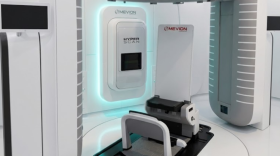A new study from Duke University suggests a chemical found in many plastics can make breast cancer cells resistant to treatment.
The report discusses the effects of BPA on Inflammatory Breast Cancer cells. It's a type of cancer found in 1-5 percent of breast cancer cases. Researchers suggest that the chemical neutralizes the effects of prescription drugs meant to keep the cancerous cell from growing.
Co-author Scott Sauer says it was important to look at the drug resistance factor, not just how the BPA interacted with the cancer itself.
"People in the field of BPA research don't think about that particular thing," he said. "They're only thinking about making cancers more aggressive, not necessarily how they will respond to treatment because of exposure."
The study also showed the BPA encouraging the growth of the cancer. About 5 million pounds of BPA is distributed in the U.S. every year -- a small portion of which is used in plastic bottles and food containers.
"Even though it does seem like they're starting to phase out some BPA, almost everyone in developed countries has BPA circulating in their body and are constantly being exposed to it," said Sauer.
The study was performed on in-vitro cells, outside of a human body. Sauer hopes continued trials will add to the body of evidence regarding BPA's effects on adult populations.







